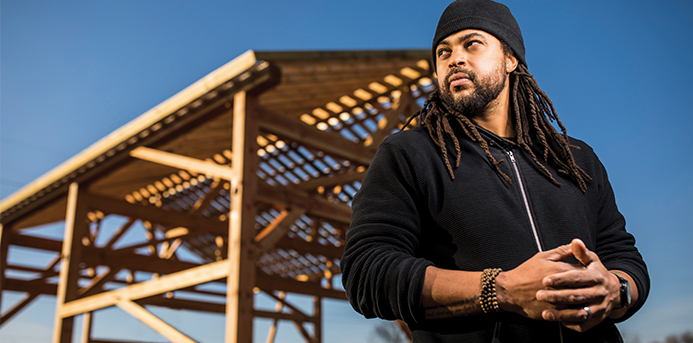Meet seven incredible innovators on the front lines of urban sustainability. As stewards for the future, they’re working tirelessly to engage local and global communities in the fight against climate change — and their efforts are shaping the world.
Emmanuel Pratt
Executive Director of Sweet Water Foundation
Emmanuel Pratt, with his partners, has turned blocks of vacant lots on the South Side into an urban farm and greenhouse overflowing with fresh produce in a part of the city known as a food desert. And he has turned a former shoe factory into an aquaponics operation, growing tilapia fish and plants that filter the water and feed on nutrients from the tilapia. But Pratt does not consider his mission to be farming or gardening or aquaponics. Rather it is “radical reconstruction” and “regeneration,” as he explains, building on the assets of the neighborhood and its history to create enterprises that bring people together, create economic vitality, improve health and wellness, and achieve other aims.
Pratt is executive director of the Sweet Water Foundation, which he co-founded tapping his formal expertise in urban planning, architecture, and design, and his deep community connections and commitment. “The single-bottom-line, return-on-investment strategy has basically led us to where we are right now, the bipolarity we have in the city of Chicago, where it is an extreme difference between the haves and have-nots,” Pratt says. “We have a built environment that is a reflection of our consciousness and the lack of a moral compass. There’s the public and private sector; we’re in the third sector — a collaborative economy and sharing economy where people are figuring out how to make things work together.”
Sweet Water provided part-time employment to about 100 people last year. Its home base, known as Perry Avenue Commons, includes a carpentry shop, silk-screening, and other workshops, along with the urban farming and aquaponics. Live-work spaces for visiting artists are also in the works, and the foundation is partnering with cultural institutions including the Hyde Park Art Center and Smart Museum of Art, where Pratt is the 2017-2018 interpreter-in-residence.
Last fall, Sweet Water held an old-fashioned barn raising to construct what Pratt says is the first timber-frame barn built in the city since the Great Chicago Fire. It is on the site of the former Moseley Correctional School, which closed in the 1990s. This Thought Barn will be used for any number of activities and programs including art, education, weddings, and a massive Juneteenth celebration block party. “It’s on a site that used to be a school,” Pratt says. “And in many ways, it is a school — it’s equipping people with the capacity to raise themselves up and collectively share ideas.” —KL
Ana Garcia Doyle
Co-Founder of One Earth Film Festival
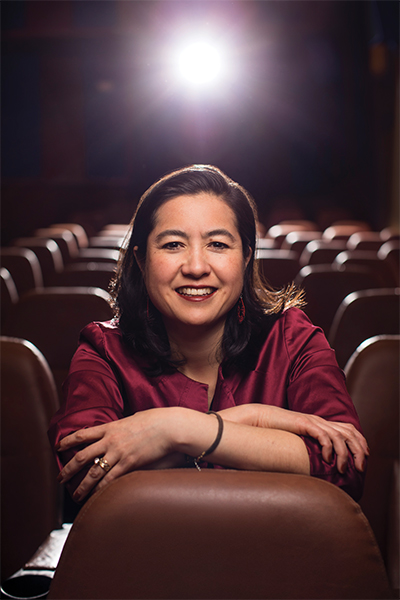
As a youngster living in a rural area outside Baltimore, Ana Garcia Doyle spent afternoons romping through the woods and finding salamanders in the creek, free-range style. But after her family moved to Wrigleyville, she became a true city kid; she pegs the dawning of her ecological awareness much later, when she had just had her own child and was living with her husband in Zurich, Switzerland. “Living abroad opened my eyes to people living really differently — closer to nature, and without runaway consumerism,” she notes. Stores were closed on Sundays, which meant people spent time outdoors at the lake or in the mountains, and healthy living was simply a way of life; it was there, she notes, that she became especially aware of providing natural, healthy food and surroundings for her baby.
After she moved back to the Chicago area and was inspired by the words of “The New Jim Crow” author Michelle Alexander, Ta-Nehisi Coates and others, Garcia Doyle’s understanding of ecology grew to include social equity. Expanding the tent of environmentalism to encompass marginalized communities and communities of color is a major tenet of the One Earth Film Festival, which Garcia Doyle co-founded in 2012 with several screenings in Oak Park and River Forest and nurtured to its current incarnation: 33 films screened in 47 venues across the Chicago area earlier this month. Last year, almost 16,000 people attended the films and related events.
The films are chosen by local communities, and each year has a theme. This year’s was “this is the moment,” which was meant to be open-ended: this is the moment for volunteering, for marching, for running for office, for otherwise helping to change the world.
One Earth is part of a larger nonprofit organization, Green Community Connections, which focuses on developing sustainable and resilient communities on the West Side of Chicago. It involves local youth leaders in projects like growing food and creating butterfly gardens. Garcia Doyle hopes this year’s film festival catalyzed awareness, action, and dialogue on the local level and beyond. “Let’s figure out how to move our planet forward … to be just, resilient, sustainable, all of it,” she says. —KL
Dr. Nancy Tuchman
Founding Dean of Loyola University’s Institute of Environmental Sustainability
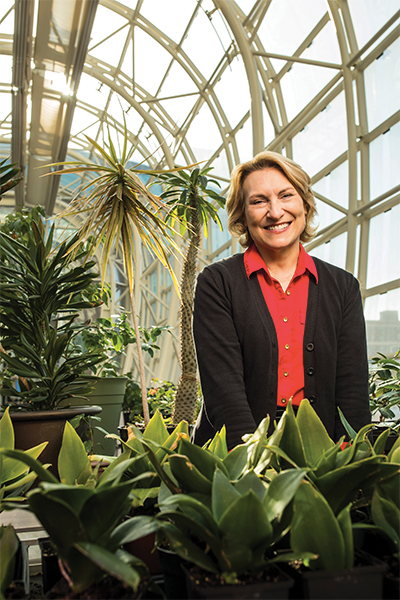
Dr. Nancy Tuchman grew up in Northern Michigan with amateur ecologist parents and spent her childhood outdoors exploring the abundant lakes and streams. So when she became a biologist and professor of aquatic ecology at Loyola University, she focused on studying carbon dioxide’s impact on aquatic ecosystems and food webs. “I gravitate toward water,” she says. “It could be rivers, streams, wetlands. I love any walk in the woods, I love being in a canoe, and I love just walking in a stream with sneakers on.”
Her work segued into trying to help protect those fragile ecosystems and the world as a whole from climate change and other ecological stresses. She became the founding Dean of Loyola University’s Institute of Environmental Sustainability, overhauling the school’s own sustainability practices and spreading awareness and training students about sustainability and the environment.
In the fall Tuchman and co-author Dr. Michael Schuck, a Loyola theology professor, received an award from the Vatican and met Pope Francis because of their e-book “Healing Earth.” Tuchman describes it as an “environmental science textbook that has both an ethical lens and a spiritual lens,” addressing biodiversity, natural resources, climate change, and other topics.
On March 15-16, Loyola’s Institute of Environmental Sustainability hosted the school’s fifth annual summit on climate change. This year’s theme was climate change impacts on human health, with panels exploring the health repercussions of recent hurricanes, wildfires, mudslides, and the like. The keynote speaker was Gina McCarthy, head of the Environmental Protection Agency under President Obama.
Tuchman also still works with students at a Michigan research station studying invasive plants in the Great Lakes coastal wetlands. “Teaching them about just how intricate nature is, the design of nature, the beauty of nature, the fragility of nature and also the complexity — all those things make you feel this sense of awe,” she says. “I always felt like conveying that piece of it to students was the most exciting: seeing their eyes light up when they see amazing things happen in nature.” —KL
Andrea Sreshta and Anna Stork
Founders of LuminAID

People in developed countries often take electric light for granted. But across the globe, many millions of people live without electricity, depending on candles, kerosene lanterns, gas-guzzling generators, or other sources that can be harmful to the environment and human health. And Hurricane Maria’s devastation of Puerto Rico showed just how fragile access to an electric grid can be even in developed countries.
Young entrepreneurs Anna Stork and Andrea Sreshta are providing an alternative, through their company LuminAID, making durable, affordable solar lanterns well-suited to disaster areas, humanitarian crisis situations, countries lacking electric infrastructure, and even outdoor adventurers. “We believe light is a very essential human need,” says Stork. “Light can really provide a level of comfort, allow people to take care of their families, and work more hours so they can make more money.”
As architecture graduate students at Columbia University, the duo were inspired to create LuminAID after the 2010 earthquake in Haiti. They made the first 50 prototypes by hand and raised money through crowdfunding. Stork had interned at a U.S. Army lab that was investigating how to best heat food in remote locations, piquing her interest in developing technologies to provide energy to people lacking basic infrastructure. Sreshta’s family is from India, and on visits there she experienced firsthand the impacts of frequent outages and lack of electricity.
In 2013, Stork and Sreshta won a prestigious award in the Clean Energy Challenge competition for startups in Chicago. They also appeared on the TV reality show “Shark Tank” and secured investment from billionaire Mark Cuban. Now they are fine-tuning their next offering, a dual solar lantern and cellphone charger. Their distribution innovations include a popular program where people purchasing their own LuminAID lanterns can also buy a lantern for someone in need. They partner with organizations on the ground in the countries — now more than 100 — where the lanterns are distributed.
They recently traveled to Puerto Rico, where more than 10,000 lanterns have been distributed since Hurricane Maria, including through a program with Chicago family foundations and clean energy companies and groups. Sreshta says that since the recent hurricanes, they’ve worked with more U.S.-based disaster relief organizations and “really saw a huge increase in awareness throughout the U.S. … that these types of disasters can happen close to home. People were very interested in starting to prepare and take that more seriously. Hopefully it’s something that will continue to grow as people become more aware.” —KL
Mike Abt
Co-President of Abt Electronics
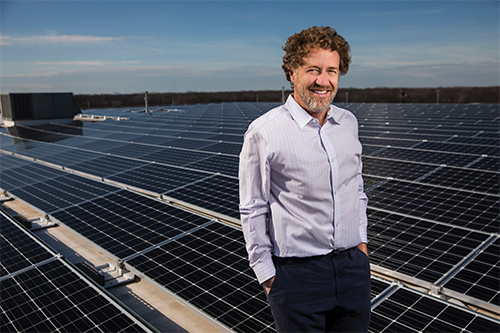
During his time as a student at the University of Colorado, Mike Abt worked as a naturalist at a camp on an island in Washington state. The island was abundant not only in natural beauty, but also in pigs that ate much of the food waste from the camp. It was a lesson in reusing and recycling that Abt took to heart later at the family business, Abt Electronics, where he is co-president alongside his three brothers.
The Glenview-based company sells a wide range of goods including TVs, exercise equipment, mattresses, power tools, and phones. It also makes durable energy-efficient appliances, helping customers cut down on their energy use. Abt Electronics has an on-site recycling center where it coordinates recycling of almost all of its waste, including cardboard boxes, Styrofoam, plastics, and metals. The company’s trucks collect packing materials, old mattresses and appliances, and other refuse from customers and bring it to the recycling center where it is sorted and sent out to different facilities for recycling. Not only is the practice environmentally friendly, but it also helps the company’s bottom line. They avoid the major expense of waste disposal and earn money for the copper and other materials they recycle.
The company also generates energy on-site, with solar panels and a Tesla Powerwall battery that stores energy to use when the sun isn’t shining. They get a rebate from ComEd for allowing the utility to tap power from their battery when it’s needed to help stabilize the grid or meet high demand. Abt notes that the financial arrangement with ComEd panned out well after tricky logistical twists and turns. He also tried to install wind power onsite, but that didn’t work so well. Meanwhile he’s got a green roof ready for installation, which will lower heating and cooling costs and provide a space for vegetation and maybe a beekeeping operation. “We’re never scared to fail,” Abt says. “Don’t be afraid to take chances. Sometimes we win, sometimes we lose. Everything is a learning experience.” —KL
Sarah Grueneberg
Head Chef and Owner of Monteverde Restaurant & Pastificio
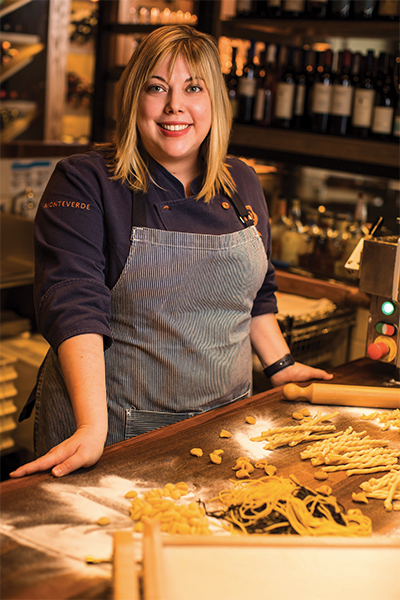
Even at a young age, Sarah Grueneberg knew that food wasn’t just something you picked up at a grocery store. She grew up an only child in Texas, cooking with her mother and grandmother, visiting cattle auctions with her grandfather, walking her family’s land, pulling up onions, and cutting cabbage. By age 12, she realized that she wanted to be a chef — that cooking, which started as a way to entertain herself, had become her passion. Culinary school led to Brennan’s in Houston, then to Chicago and Spiaggia, and a season on Bravo’s “Top Chef.” Grueneberg opened Monteverde Restaurant & Pastificio in late 2015 to local and national acclaim, then won the 2017 James Beard Award for Best Chef: Great Lakes, and the 2018 Jean Banchet Award for Restaurant of the Year, among myriad other accolades. Seasonal farm-to-table cooking is a hallmark of the restaurant; that translates to gorgeous local asparagus and ramps in the spring, cabbages and squash in the winter. Fresh pasta is made daily in the open kitchen, and vegetables are used with abandon, as is the Italian way.
The Monteverde team thinks and acts locally whenever possible. Eggs, vegetables, and proteins are all sourced in the Midwest, as are polenta and rye flour. “In the winter, it’s much more challenging to find local produce, but new farms and producers are helping,” says Grueneberg. They’re purchasing two pigs a month from a Michigan farmer, accepting the challenge of snout-to-tail utilization. “We are trying to source responsibly, using animals that are raised humanely and processed to the highest standards, and trying to support local farmers on our menus and website,” she says.
“The margins of a restaurant are small already, so we also strive to be very conscious of our waste,” she says. One of the most popular pasta dishes, Cacio Whey e Pepe, reuses the whey from the house-made fresh ricotta as part of the sauce, an effective technique to maximize ingredients.
“I think you should try to know your farmers and support the people who work so hard to grow the vegetables and raise the animals,” Grueneberg says. “I think that those relationships make the food more real and the dish more special. Because there’s feeling and emotion in that, and those relationships start even before something is cooked and plated. I think our guests can feel that. They can feel that connection with the grower.” —JC
Sarah Grueneberg will be receiving FamilyFarmed’s Good Food Chef of the Year award at the upcoming Good Food EXPO (Make it Better is a media sponsor of this event). Don’t miss her chef demo on March 24! For more info and to register, visit goodfoodEXPO.org.
